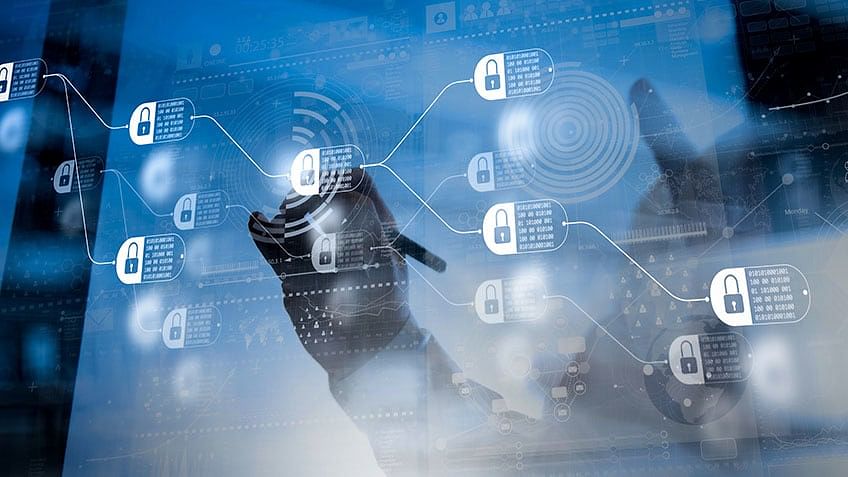Blockchain technology has revolutionized various industries, offering transparency, decentralization, and immutability. However, as the adoption of blockchain continues to grow, the importance of blockchain security becomes increasingly evident.
In this blog post, we will delve into the concept of blockchain security, exploring its significance and providing six examples of secure blockchain solutions.
Understanding Blockchain Security
Blockchain security refers to the measures and protocols implemented to safeguard a blockchain network from potential threats, attacks, and vulnerabilities.
The decentralized nature of blockchain, while offering numerous benefits, also poses unique security challenges. Ensuring the integrity and confidentiality of data, as well as protecting against unauthorized access and manipulation, are paramount in maintaining a secure blockchain environment.
Key Components of Blockchain Security
Cryptographic Techniques
Blockchain relies heavily on cryptographic techniques to secure transactions and data. Public and private key pairs are used to authenticate users and ensure the confidentiality of information.
Hash functions play a crucial role in creating a unique identifier (hash) for each block, linking them in a tamper-resistant chain. These cryptographic elements contribute to the overall security and immutability of the blockchain.
Consensus Mechanisms
Consensus mechanisms are fundamental to the security of blockchain networks. They determine how nodes within the network agree on the validity of transactions and the state of the blockchain.
Popular consensus mechanisms like Proof of Work (PoW) and Proof of Stake (PoS) provide a secure way to achieve agreement among participants, preventing malicious actors from manipulating the system.
Smart Contract Security
Smart contracts, self-executing contracts with the terms of the agreement directly written into code, are a key feature of many blockchain platforms.
Ensuring the security of smart contracts is crucial to prevent vulnerabilities and exploits. Auditing and testing smart contracts for potential flaws and vulnerabilities before deployment are essential practices to enhance blockchain security.
Top 6 Examples of Secure Blockchain Solutions
1. Hyperledger Fabric
Hyperledger Fabric is an open-source enterprise blockchain platform designed for developing secure and scalable solutions. It employs a permissioned network, meaning that participants must be authenticated and authorized to join.
With a modular architecture, Hyperledger Fabric allows organizations to implement customized security policies and access controls, making it a preferred choice for business applications requiring a high level of confidentiality.
2. Ethereum 2.0
Ethereum, one of the most widely used blockchain platforms, is undergoing a significant upgrade with Ethereum 2.0. This upgrade aims to enhance scalability, sustainability, and security.
Moving from a Proof of Work to a Proof of Stake consensus mechanism, Ethereum 2.0 addresses the energy inefficiency concerns associated with mining. This transition improves the overall security and sustainability of the Ethereum blockchain.
3. Binance Chain
Binance Chain is a blockchain platform developed by Binance, one of the largest cryptocurrency exchanges globally. It focuses on providing fast and low-cost transactions for decentralized applications (DApps) and digital assets.
With a streamlined architecture, Binance Chain ensures high performance and security, making it a suitable choice for various blockchain-based projects.
4. Corda
Corda is a blockchain platform specifically designed for the financial industry. It emphasizes privacy and security, allowing businesses to transact directly and privately with each other.
Corda’s unique approach to consensus, using a notary service to validate transactions, enhances privacy and reduces the risk of double-spending. This makes Corda a secure choice for financial institutions seeking blockchain solutions.
5. Tezos
Tezos is a self-amending blockchain that enables on-chain governance, allowing the network to evolve and upgrade without requiring hard forks.
With a focus on formal verification, Tezos enhances security by mathematically proving the correctness of smart contracts. This approach minimizes the risk of bugs and vulnerabilities, making Tezos a secure and adaptable blockchain platform.
6. Stellar
Stellar is a blockchain platform designed for facilitating cross-border payments and asset transfers. Known for its fast transaction processing and low fees, Stellar incorporates a unique consensus mechanism called the Stellar Consensus Protocol (SCP).
SCP ensures decentralization and security by allowing nodes to vote on the validity of transactions, making Stellar a secure solution for financial transactions and remittances.
Future Trends in Blockchain Security
Looking ahead, several trends are expected to shape the landscape of blockchain security, further enhancing the technology’s resilience and adaptability.
Decentralized Identity Management
Decentralized identity solutions aim to provide users with more control over their personal information while minimizing the risk of identity theft. Blockchain-based decentralized identity platforms allow individuals to manage their digital identities securely, reducing reliance on centralized entities.
Secure Tokenization
Tokenization involves representing real-world assets as digital tokens on a blockchain. As tokenization gains momentum, ensuring the security of these digital representations becomes paramount. Secure tokenization solutions, backed by robust smart contracts and cryptographic techniques, offer a secure means of representing and trading assets on the blockchain.
Integration of Artificial Intelligence (AI)
The integration of AI in blockchain security is an emerging trend. AI-powered solutions can analyze vast amounts of data, detect patterns, and identify potential security threats in real time. This proactive approach to security enhances the overall resilience of blockchain networks.
Conclusion
As blockchain technology continues to evolve and integrate into various industries, the importance of blockchain security cannot be overstated. Implementing robust cryptographic techniques, consensus mechanisms, and secure smart contracts are essential steps in creating a secure blockchain environment.
Read More: A Blockchain-Based Decentralized Data Security
